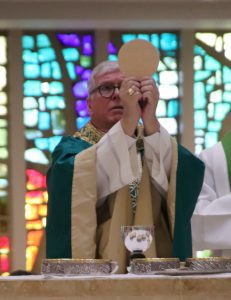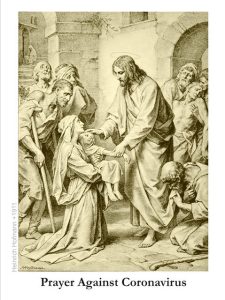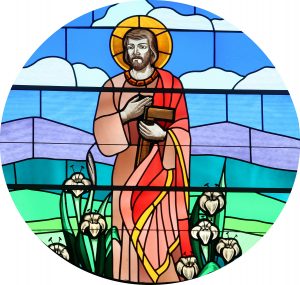Every year directors and staff of local pregnancy help centers, maternity homes and after-birth homes come together for a day to share and learn from one another.
The latest gathering, Heartbeat 2.0 Retreat, took place on Sept. 5, 2025, at Our Lady of Perpetual Help Retreat Center in Venice, and covered a wide variety of topics.
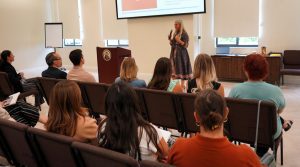 The retreat, hosted by the Diocese of Venice, included a presentation by Sara Johnson, from Florida Voters Against Extremism, on the ongoing fight to seek an end to abortion in Florida.
The retreat, hosted by the Diocese of Venice, included a presentation by Sara Johnson, from Florida Voters Against Extremism, on the ongoing fight to seek an end to abortion in Florida.
Johnson provided an update on the political landscape of Florida and the United States in the wake of the major 2024 ballot initiative. While Amendment 4, a proposed extreme amendment which would have catastrophically expanded access to abortion in Florida, went down to defeat, Johnson warned that the sentiments on abortion in Florida make the state vulnerable to more attempts to change the laws.
“The numbers are clear, 63% of Floridians think abortion should be legal,” Johnson said. “That is a huge number and makes Florida vulnerable. However, most Floridians think the Heartbeat Protection Act, the current law which prevents abortion after six weeks of gestation, with six exceptions, is reasonable and restrictive enough.”
While the Florida law does not eliminate access to abortion, it is a big step, Johnson stressed. The support behind expanding abortion access dumped $120 million into the Amendment 4 campaign and more money is being raised for ballot amendments in the coming election cycles, if not in 2026, but perhaps 2027 and more likely in 2028.
“It is a coordinated attack to enshrine this agenda of death,” Johnson said. “None of us believe abortion should be legislated or exist at all. Now is the opportunity to educate what it is we are trying to accomplish, that is saving the unborn.”
Pam Stenzel, from BrightCourse and Community Pregnancy Clinics, said the Florida law has many flaws and the perception of it has changed the way girls/women are approaching their decision to choose life or not.
“There is a 24-hour waiting period for getting an abortion, and that is the only time we have to connect with these girls,” Stenzel said. “If she calls one of the pregnancy resources centers (in the Diocese), someone has to be available to answer that inquiry within 15 minutes to answer the immediate need, or else she is gone.”
This reality exists because there is ready access to a chemical abortion through a pill prescription, which is not as regulated as a surgical abortion which takes place in a facility.
Stenzel spoke about a service that is available through Infinite Worth that links pregnancy resource centers to a nationwide response network which offers services through online or phone calls 24/7.
The final speaker was Karin Barbito from Support After Abortion. Because the majority of women and men who have experienced abortion want healing but don’t know where to go for help, Support After Abortion offers compassion and support for all of those impacted by abortion.
Barbito also spoke about Project Rachel, which offers retreats for women who have had an abortion, as well as Walking with Moms in Need, a U.S. Bishop’s program which operates at the Parish level, to increase support for pregnant and parenting mothers in need. It works to ensure that any woman who finds herself unexpectedly pregnant, or parenting in difficult circumstances, can turn to her local Catholic Church and be connected with the resources she needs.
For a list of the Pregnancy Resource Centers who support Walking with Moms in Need, please visit https://dioceseofvenice.org/pregnancyhelp/.
If you have any questions about Respect Life activities in the Diocese of Venice, or would like to get involved, contact Tavia Ames at 941-484-9543 or ames@dioceseofvenice.org.






 Totus Tuus is an exciting Catholic Parish Catechetical Camp for students in grades 1 – 12. The weeklong day camp held at Parishes in the Diocese of Venice is led by trained, paid missionaries. Missionary applications for the summer 2025 camp are now being accepted from anyone, age 18 or older, with an authentic, dynamic Catholic faith who is actively living the teachings of the Catholic Church. One year of college/work is preferred, but mature recent high school graduates will be considered. This is a great summer experience for anyone who wants to work in ministry, education, or with children in other settings. Visit
Totus Tuus is an exciting Catholic Parish Catechetical Camp for students in grades 1 – 12. The weeklong day camp held at Parishes in the Diocese of Venice is led by trained, paid missionaries. Missionary applications for the summer 2025 camp are now being accepted from anyone, age 18 or older, with an authentic, dynamic Catholic faith who is actively living the teachings of the Catholic Church. One year of college/work is preferred, but mature recent high school graduates will be considered. This is a great summer experience for anyone who wants to work in ministry, education, or with children in other settings. Visit 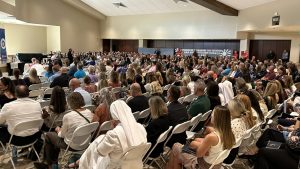
 In addition to focusing on promoting a Catholic Culture in each classroom, Father Belmonte asked the educators to focus on the Gift of Christ: Courage. This is the strength given to each educator by the Lord to live out the mission of Catholic education in the Diocese of Venice, that is to introduce the Lord and Savior to the world.
In addition to focusing on promoting a Catholic Culture in each classroom, Father Belmonte asked the educators to focus on the Gift of Christ: Courage. This is the strength given to each educator by the Lord to live out the mission of Catholic education in the Diocese of Venice, that is to introduce the Lord and Savior to the world.
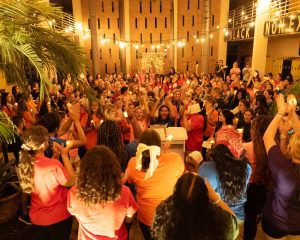



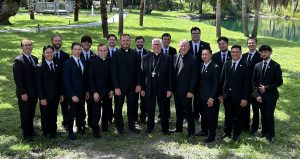
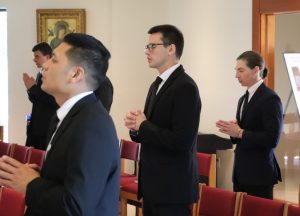
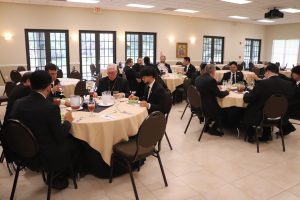
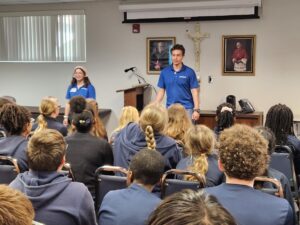
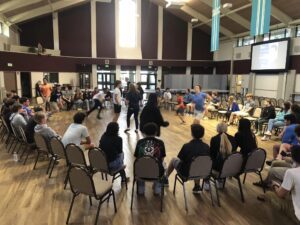

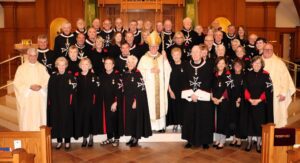
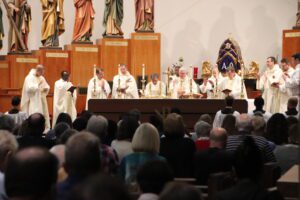

 The group travelled about 40 minutes from their school to Immokalee, a short physical distance but the retreat was a long spiritual journey that surprised many in how deeply it impacted them.
The group travelled about 40 minutes from their school to Immokalee, a short physical distance but the retreat was a long spiritual journey that surprised many in how deeply it impacted them. The service trip was organized and led by Sisters April Hoffman and April Cabaccang, Salesian Sisters of St. John Bosco, both of whom are on the faculty at St. John Neumann. To start the week, they prayed each student would gain a renewed sense of Christian Service from their experience. The theme for the week was based on a Gospel quote from 1 Peter 4:10 – “Each of you should use that gift you have to serve others.”
The service trip was organized and led by Sisters April Hoffman and April Cabaccang, Salesian Sisters of St. John Bosco, both of whom are on the faculty at St. John Neumann. To start the week, they prayed each student would gain a renewed sense of Christian Service from their experience. The theme for the week was based on a Gospel quote from 1 Peter 4:10 – “Each of you should use that gift you have to serve others.”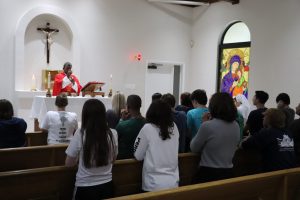 Some admitted to participating in the retreat to earn service hours or because a friend was participating. But then, something changed. As the week progressed, the teens began to grow as Christians, shining the light of Christ in the community while also finding the face of the Lord in all whom they encountered.
Some admitted to participating in the retreat to earn service hours or because a friend was participating. But then, something changed. As the week progressed, the teens began to grow as Christians, shining the light of Christ in the community while also finding the face of the Lord in all whom they encountered.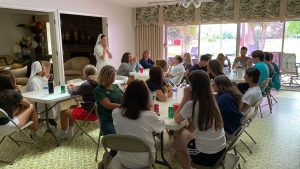 Each day included evening Mass celebrated at Our Lady of Guadalupe Parish by Father Inna (Ignatius) Reddy Yeruva, Missionary of Compassion, who works with Catholic Charities.
Each day included evening Mass celebrated at Our Lady of Guadalupe Parish by Father Inna (Ignatius) Reddy Yeruva, Missionary of Compassion, who works with Catholic Charities. For example, when some of the students were assigned to count beans at the Casa Maria Soup Kitchen of Catholic Charities, the task seemed pointless, but the youth quickly learned that it was important to sort through the beans to ensure proper portion sizes and their helping lessened the work of the only paid employee of the Soup Kitchen.
For example, when some of the students were assigned to count beans at the Casa Maria Soup Kitchen of Catholic Charities, the task seemed pointless, but the youth quickly learned that it was important to sort through the beans to ensure proper portion sizes and their helping lessened the work of the only paid employee of the Soup Kitchen.
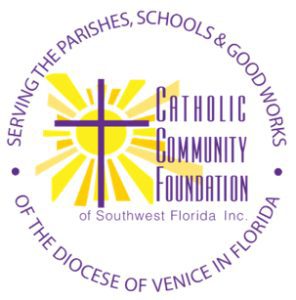
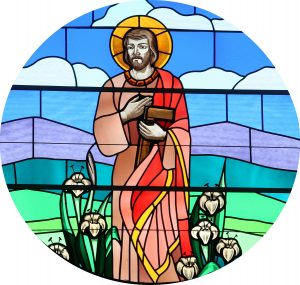
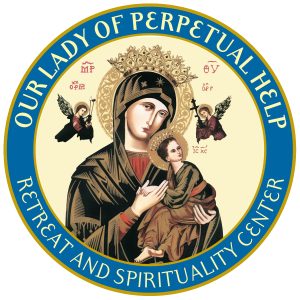

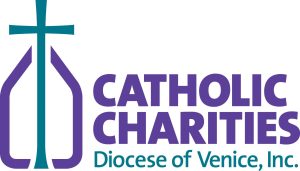 If you need assistance from Catholic Charities for food, financial assistance or tele-mental health counseling, please call the number for your area listed below 9 a.m.-5 p.m., Monday-Friday:
If you need assistance from Catholic Charities for food, financial assistance or tele-mental health counseling, please call the number for your area listed below 9 a.m.-5 p.m., Monday-Friday: